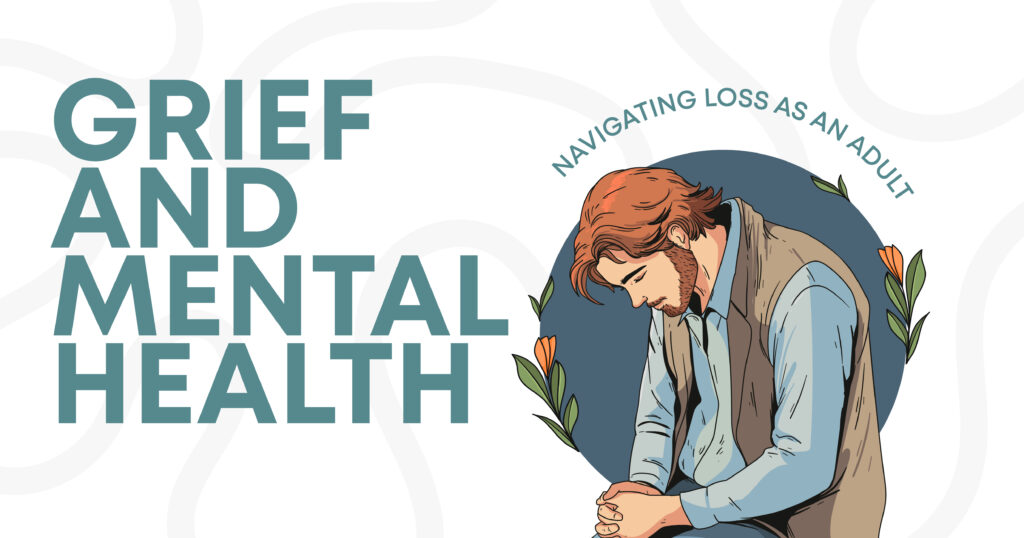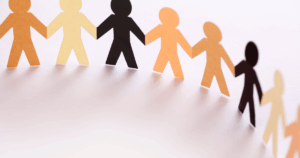Grief is a personal thing. No two people face it in the same way. Whether it be a recent loss of a loved one, divorce, or any other variation of what may be considered a major loss, it’s vital to first comprehend your feelings as being completely valid. Grief isn’t just an emotional response. It has a direct impact on mental health, often surfacing in ways that can feel overwhelming.
In this article, we will discuss the relationship between grief and mental health, the stages of grief, the types of loss, and helpful ways to get through it. Let me start by defining grief and what it does to one’s brain and emotions mentally.
What Is Grief?
Grief is a natural yet very complex emotional response to loss and can frequently show up as sadness, anger, confusion, or numbness. While conventionally associated with the death of a loved one, grief is also evoked in many people by other forms of loss, including the loss of a critical relationship, job loss, or the dissolution of identity.
Grieving is generally universal, but it is a very personal matter. It can affect in your thoughts, emotions, and even your body. You may feel like you are on an emotional roller coaster-one minute feeling okay, then overwhelmed with sadness the next minute. This is normal.
Mental Health Center of San Diego
How Grief Affects Mental Health
Grief isn’t exactly sadness; it affects your mind on a deeper level. It is normal for one to feel grief after losses in life, but when grief takes on the pattern of a constant or never-ending fact of everyday life, it grows into active mental health disorders. These may include major depression and anxiety, also known as Complicated Grief Disorder. Understanding how grief links with your mind will help you recognize when additional support is needed.
Grieving individuals often experience symptoms such as:
| Emotional numbness | Feeling detached or emotionally flat. |
| Anxiety | Worrying excessively about the future or about losing someone else. |
| Depression | Persistent feelings of sadness or hopelessness, losing interest in activities that once brought joy. |
| Sleep disturbances | Difficulty falling asleep or staying asleep, as well as nightmares or vivid dreams. |
| Difficulty concentrating | Need help focusing on tasks or remembering things. |
Everyone processes grief differently, but when these symptoms start to interfere with your ability to function, it may be a sign that your grief is impacting your mental health in more severe ways.
The Stages of Grief: Understanding the Process
It’s common to hear about the “five stages of grief,” which are meant to help people understand the emotional journey of loss. These stages are not to be followed in some sort of order or a direct roadmap for everyone. Instead, they offer a general framework of common emotions people experience while grieving.
- Denial
In this initial stage, denial serves as a buffer to the intense pain of loss. You might struggle to accept what has happened or feel numb to the reality of the situation. Denial is your mind’s way of protecting you from being overwhelmed all at once.

- Anger
Once the reality of the loss sets in, it’s common to feel anger. You might direct this anger at yourself, at others, or even at the person you’ve lost. Anger can also be an expression of frustration or helplessness over the situation.
- Bargaining
During this stage, you may think about “what ifs” and “if onlys.” Bargaining is trying to regain control in the face of uncertainty, hoping that some change or decision could have prevented the loss.
- Depression
The depression stage can be the most emotionally draining. It’s characterized by deep sadness, isolation, and an overwhelming sense of despair. It’s important to understand that this depression is not a sign of mental illness but a natural response to grief.
- Acceptance
Reaching the acceptance stage doesn’t mean you’re “over” your grief. Instead, it means that you have come to terms with the loss and are starting to figure out how to move forward. Acceptance often involves integrating the loss into your life and finding ways to live meaningfully despite it.
Types of Loss and Their Impact on Mental Health
Although the loss associated with the death of a loved one is perhaps most commonly associated with grief, other kinds of loss can cut very deep, hurting your mental health. Now, let’s look at just how different losses can result in grief and emotional strain.
Losing a Loved One
Among the worst sorrows one can experience are those involving the loss of a loved one, be it a parent, spouse, friend, or one’s child. The emotional and mental burden can be so intense as to feel impossible to bear, engendering deep sorrow, anger, and even confusion. If the death was quite unexpected or sudden, feelings of shock and disbelief can be that much more intense.
Divorce or Relationship Breakups
Losing a significant relationship, either through divorce or a breakup, can bring about a form of grief very much in common with the emotional load of suffering a loved one’s death. You are not simply losing that person; you are losing all the hopes and dreams you had for a future together. Feelings of abandonment, loneliness, guilt, and self-blame are common accompaniments to this kind of grief.
Job Loss or Career Changes
Job loss may also bring grief, and mainly if your career is linked with your identity or self-worth. Regardless of whether one gets laid off, fired, or simply decides to change careers, feelings of loss are to be expected and can be pretty turbulent emotionally. You may feel as though you have lost your life’s purpose or are worried about finances and the future.
Mental Health Conditions Linked to Grief
Where it is expected for one to grieve, sometimes it may extend to more serious conditions. Awareness of how grief could develop into things like depression or anxiety helps in understanding when it is time to seek help.
Grief-Induced Depression
Grief and depression quite often go together. However, while the feelings of grief are generally temporary and apply to a specific loss, depression is somewhat longer-term and more chronic as it is a mental health disorder. When feelings of grief linger for many months and begin to affect life by affecting work performance, interaction with others, or taking care of oneself, then you might be experiencing grief with major depressive disorder. Symptoms include:
- Constant feelings of hopelessness
- Loss of interest in activities
- Suicidal thoughts or self-harm tendencies
- Extreme fatigue
Anxiety and Grief
For some people, it is grief that serves as a catalyst for heightened anxiety: one may always feel concerned or fearful of others losing their loved ones, or one can be over-apprehensive regarding their future. Grief anxiety can also manifest itself physically: symptoms of this form of grief anxiety include panic attacks, chest pains, or a racing heart. It is vital to address anxieties of this nature since allowing them to fester will surely contribute to further deterioration of mental health.

Mental Health Center of San Diego
Complicated Grief Vs. Normal Grief
Normal grief is painful but limited in duration. In most individuals, the sense of loss fades over time. Complicated grief is similar but overwhelming and long-lasting; it persists with its pain and interferes with daily functioning. Individuals with complicated grief are found incapable of realizing their loss. They always long for the deceased or the situation that no longer exists. Such a person may retreat from friends and family and avoid activities that bring them pleasure.
Coping With Grief: Strategies for Healing
There is no quick fix for grief, but there are healthy ways to cope and manage your emotions as you heal. Here are several coping strategies that can help you navigate this difficult time.
Healthy Coping Mechanisms
- Journaling: Writing down your thoughts and feelings can help you process your emotions. It provides a safe space to express your grief without judgment.
- Talking to Loved Ones: Don’t be afraid to lean on family and friends for support. Sharing your feelings with others can help alleviate some of the emotional weight you’re carrying.
- Honoring the Memory: Create rituals or traditions to honor the memory of your loved one or the situation you’ve lost. This can help provide closure and a sense of connection.
- Self-Care: Grief often leads to neglecting your basic needs, but maintaining a routine, eating nutritious foods, and getting enough rest are essential for your mental health during this time.
The Role of Therapy in Grief Recovery
Sometimes, grief becomes too overwhelming to handle on your own. Therapy can be a valuable resource for working through your emotions. Grief counseling, Cognitive Behavioral therapy (CBT), and support groups provide structured environments where you can talk about your loss and learn healthy ways to cope.
Finding Support From Friends and Family
One of the most important aspects of healing from grief is surrounding yourself with a support system. Don’t hesitate to reach out to those around you, even if it’s just for a shoulder to cry on. Allowing others to help you can provide comfort and reassurance that you’re not alone in your struggle.
Coping Mechanisms for Long-Term Grief
Some losses stick with us for the rest of our lives, and that’s okay. For long-term grief, here are ways to manage and continue your healing process.
Creating New Routines and Traditions
Moving forward after a significant loss doesn’t mean forgetting the past. It’s about creating new routines and traditions that allow you to carry your loved one’s memory while still living your life. For example, you could celebrate important anniversaries differently or create new milestones that reflect your current situation.
Mindfulness and Meditation for Grief
Mindfulness and meditation are excellent tools for dealing with overwhelming emotions. They encourage you to stay present and focus on your body’s physical sensations, helping to release tension and ground yourself. Practices like deep breathing, guided meditation, or even yoga can help bring calm during emotional storms.
Art and Creative Expression
Sometimes, words aren’t enough to process grief. Engaging in creative outlets like painting, writing, or music can release emotions. Expressing your grief through art allows you to channel your feelings healthily and productively.

When to Seek Professional Help
It’s important to understand that asking for help isn’t a sign of weakness. If you feel like your grief is too overwhelming to manage on your own, or if it’s affecting your daily life, it may be time to seek professional help.
- Prolonged Depression: If you’ve been grieving for months and the sadness won’t lift, you might be experiencing clinical depression. Speaking with a therapist or counselor can help.
- Inability to Function: If you’re finding it difficult to go to work, take care of yourself, or socialize, this may be a sign that you need additional support.
- Suicidal Thoughts: If you’re experiencing thoughts of self-harm or suicide, it’s critical to reach out to a mental health professional immediately.
Mental Health Center of San Diego
Navigating Grief With Compassion
While everyone experiences grief in one way or another, how one gets through it is theirs alone. Recognizing different stages associated with the grieving process, along with knowledge of the mental health effects produced by a situation given, and healthy coping mechanisms, really goes a long way to assist a person in commencing their healing process.
It’s okay to ask for help when you need it, and you are not alone. There are people out there just like you with the same experiences and feelings. It is the opinion, whether from a loved one or some professional expertise, that will give the first significant step toward healing and wholeness.









